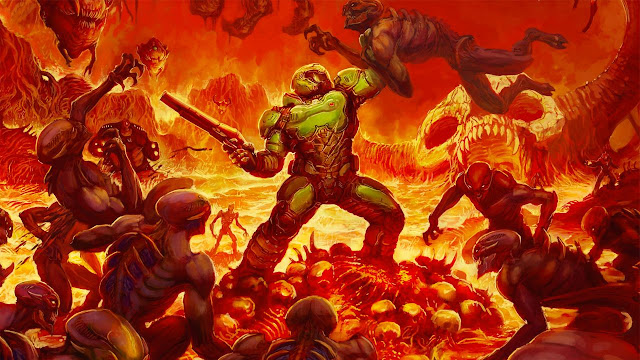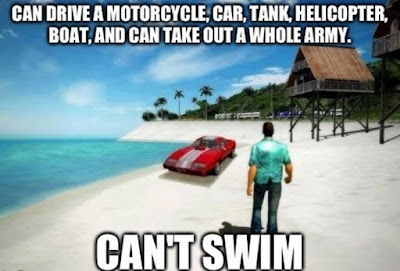Muscle Memory: Forgotten Memory Skills
I wrote this piece in July, when I caught the flu...yeah, in middle of Summer! It completely took me off my feet for a week. I don't remember why this was relevant to the article - maybe I had the idea in a fever dream? Anyway, this was originally published by Forces of Geek mid July 2016.
Our brains are programmed to use this method, they hold on to only those things that are absolutely necessary and repress skills and memories that we no longer need or use.
This is why you don’t remember anything from when you were a newborn baby (lucky really, newborn babies are dull, they just cry, eat, poop, sleep and repeat) or why you have to practice and persevere in order to be good at anything, master musicians are only great because they continued levelling up a particular skill set.
Being ill recently, I’ve not had much dedicated gaming time and it’s been a while since I’ve played a new release. However, my husband bought us Doom last week, it was on offer and a free update had just been released. That, and he has always enjoyed the franchise. Unlike my husband, my own history with Doom is admittedly limited, I played the first one in 1998 (it was originally released 1993) but I never played any of sequels or spin-offs. Surprisingly, what struck me when I began playing this new version was how (excuse the pun) alien it felt. I felt like I was playing the original again.
As with most modern day shooters the controls were intuitive (if you’ve played one FPS, you’ve played them all) but it was the actual gameplay that hindered me because I had forgotten what it was like to circle strafe, something that was once ingrained in me as a gamer. Most first person shooters today rely on cover based attacks and utilise regenerative health so at first picking up health packs, having to strafe and not relying on cover felt weird, it was completely different to what I’ve become accustomed to. The movement felt incredibly fluid too, like I was gliding through each level. Probably because there was no bobbing of the camera when you stood still, which is practically standard in most current day shooters.
Gaming has evolved in such a way that certain skill sets that were once deemed as standard norms for gamers are no longer active. These long forgotten skills are lying dormant because we too, have evolved along with the games we play. For me this was clearly evident in Doom, I had to relearn (luckily it didn’t take too long) the particular formula of the game, force myself to circle strafe, to stay on the move and to remember I wasn’t carrying health packs but instead had to search them out in each map and walk over them. While it wasn’t difficult to re-adjust, it was incredibly disorientating.
I’ve experienced this feeling in other genres too, over the years I appear to have lost my ability to play real time strategy games as well as I once did. I no longer have the reaction times I used to (though that’s probably down to age) and the rules of newer titles are now unfamiliar territory. Gaming has its own unique language, we learn it with each new game we play.
The more you play a certain type of game the more you will be attuned to its nuances so as they change over time, if we haven't also adapted and evolved with them then it’s only natural we’ll find ourselves losing or forgetting skill.
The more you play a certain type of game the more you will be attuned to its nuances so as they change over time, if we haven't also adapted and evolved with them then it’s only natural we’ll find ourselves losing or forgetting skill.
But it’s not just circle strafing and my waning RTS reaction times that have changed, there are plenty of other skills lying dormant due to the evolution of gaming. Think about top down racing games, like me you might have once been a pro at Micro-Machines or the original GTA but driving games today almost never work in this way because it is now deemed as unintuitive. When I go back to top down games (of all genres, not just racing games) I find it’s harder to visualise where I am going and I need to get used to the over head perspective, in essence I am having to re-learn or recollect a skill that has been dismissed long ago by my brain as I naturally evolved.
Our brains are programmed to use this method, they hold on to only those things that are absolutely necessary and repress skills and memories that we no longer need or use.
This is why you don’t remember anything from when you were a newborn baby (lucky really, newborn babies are dull, they just cry, eat, poop, sleep and repeat) or why you have to practice and persevere in order to be good at anything, master musicians are only great because they continued levelling up a particular skill set.
Using our brains less is another thing I’ve noticed about modern day titles, not that they don’t require brainpower but there now seem to be tutorial levels in every game and this lessens our need for deductive reasoning.
Couple that with the way gaming has changed socially and you actually don’t need to think at all.
If you get stuck in a game, rather than spend time figuring it out or deducing what comes next, you can turn to YouTube for never-ending tutorials, walkthroughs and Let’s Plays. Sure you can still buy game guides and when I was growing up there were magazines with all the answers but today, the solutions are everywhere in excess.
Couple that with the way gaming has changed socially and you actually don’t need to think at all.
If you get stuck in a game, rather than spend time figuring it out or deducing what comes next, you can turn to YouTube for never-ending tutorials, walkthroughs and Let’s Plays. Sure you can still buy game guides and when I was growing up there were magazines with all the answers but today, the solutions are everywhere in excess.
In my earlier gaming years, if I couldn’t progress through a level or work out what to do next in a point and click game I had to either give up or forget about the game until years later (I’m looking at you, Ecco The Dolphin, you too Castlevania - you tricky bastards!)
Serious patience, memory and careful planning are no longer skills that we need to hone. Gone are the days of having to familiarise yourself with enemy and environmental patterns to get through a certain level or stage.
Of course, some games do still require these skills but in general, not so much. Nowadays we have auto-saves or checkpoints and you can even utilise multiple saves.
Of course, some games do still require these skills but in general, not so much. Nowadays we have auto-saves or checkpoints and you can even utilise multiple saves.
If you had to get to the end of a level in a retro game, you wouldn’t respawn next to your corpse or at a nearby checkpoint.
There were no checkpoints, you had to start a level over entirely. I remember having to restart Alex Kidd in Miracle World over and over because when I first had my Sega Master System I couldn’t save, I had to keep playing it until I memorised the entire game.
The day I completed it felt amazing because of the hours I had put into it. I have incredibly fond memories of Alex Kidd, it was the first game I ever completed.
There were no checkpoints, you had to start a level over entirely. I remember having to restart Alex Kidd in Miracle World over and over because when I first had my Sega Master System I couldn’t save, I had to keep playing it until I memorised the entire game.
The day I completed it felt amazing because of the hours I had put into it. I have incredibly fond memories of Alex Kidd, it was the first game I ever completed.
In modern titles, you’re no longer required to spend very long in one particular area (unless like me, you need to explore every crevice or hint of shininess on a map in which case, you’re my kind of gamer).
One could even argue that in modern day titles you no longer pick up on the details of a game and you take it for granted because you are simply moving from one checkpoint to the next.
One could even argue that in modern day titles you no longer pick up on the details of a game and you take it for granted because you are simply moving from one checkpoint to the next.
However, not all gaming skills of the past have been entirely lost. For all the times we complain about franchises never changing, they do keep alive a particular skill set.
Nintendo is a prime example of this, I often bemoan them for regurgitating the same games year after year. Yet in doing so, their demographic can play games from past and current titles with the same intuitive ease.
Nintendo is a prime example of this, I often bemoan them for regurgitating the same games year after year. Yet in doing so, their demographic can play games from past and current titles with the same intuitive ease.
Looking forward, imagine cover based shooting games died out or motion control was completely abandoned then, a decade or two later there was a resurgence due to nostalgia and a revival of the features we are all so accustomed to today. We’d suddenly find it disorientating and realise we’d forgotten how to do something that was once so natural.
When you swim after not doing so in many years, you don’t forget, you’re able to stay afloat but as I learnt all too recently, your muscles certainly freak the hell out. The only way to fix this is to keep on swimming. In the same vein then, to keep our gaming muscles strong, we need to flex them regularly and continue playing not just new titles but retro ones too. So next time you feel like starting a new game, why not check out some older titles instead?








Comments
Post a Comment